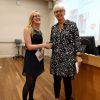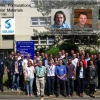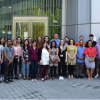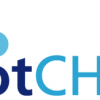Research in the TuttleLab is focused on the concept of reducing molecular search spaces. The reduction of molecular search spaces involves the use of computational methodology to inform, focus and drive the direction of molecular research. The group works in close collaboration with experimental colleagues to ensure the results from our design work are able to be directly implemented in a practical laboratory. The process of reducing molecular search spaces involves three phases: (1) rationalising and understanding existing systems; (2) isolating the governing molecular processes; and (3) predicting new systems with enhanced/desirable properties and reactivities. A variety of different methods are used in pursuit of this goal, including ab initio, DFT, semi-empirical, MM, coarse grain and hybrid QM/MM methodologies.
News From the Lab

WestChem Research Day – Katie Won!
The WestChem Research day was recently held at the University of Strathclyde. Talks were given by students from both Glasgow and Strathclyde universities and a plenary lecture by Professor Sabine Flitsch, Professor of Biochemistry at the University of Manchester. After an interesting day of talks, Katie won the prize for best talk.

SMARTNET Paris June 2016
In the beginning of June, Inês went to Paris to attend a conference on soft matter and gels, organised by SMARTNET together with Solvay (see website http://www.smartnet4u.org/2016/06/22/gels-formulations-and-supramolecular-materials/). It was an amazing 2-day conference with talks on self-assembly, gel rheology and multicomponent gel applications, from both invited speakers (Dave Adams, Gareth Lloyd, etc) and also Smartnet […]

Tuttle Lab/Ulijn Members Travel to New York for Annual Megameeting
In June, Gary and Inês travelled to New York for the Annual Ulijn group Mega Meeting in addition to the CUNY ASRC Bio|Nano|Med Conference. Both Students made excellent 45 min presentations to the group showcasing their work based on the last 3 years of their PhDs. It was an excellent week, full of a range […]

ScotCHEM Computational Chemistry Conference 2016
The ScotCHEM computational chemistry conference was hosted by the University of Edinburgh on the 14th June 2016. The day started with the plenary speaker, Dr Paola Carbone from the University of Manchester, describing their efforts in modelling polymer aggregates. Amongst the 11 speakers on the day were two members from the TuttleLab; Tomasz Piskorz […]








